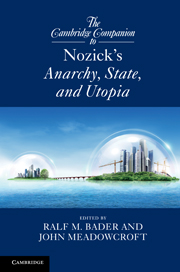Introduction
Published online by Cambridge University Press: 28 September 2011
Summary
Robert Nozick's Anarchy, State, and Utopia (1974) is recognized as a classic of modern political philosophy. In tandem with John Rawls's A Theory of Justice (1971), it is widely credited with breathing new life into political philosophy in the second half of the twentieth century. It effectively moved libertarianism from a relatively unimportant subset of political philosophy to the center of the discipline.
Anarchy, State, and Utopia (ASU) was written whilst Nozick was a fellow at the Center for the Advanced Study in Behavioral Sciences in Stanford during the academic year of 1971-972. It constitutes the combination of three separate projects that Nozick was working on at that time. Part I is based on a talk concerned with how a state would arise out of the state of nature that Nozick presented to a student group at Stanford, whilst also incorporating some of the ideas developed in his 1971 paper “On the Randian Argument.” Part II primarily results from his engagement with John Rawls's theory of justice, which led to the formulation of the entitlement theory of justice, much of which Nozick developed whilst co-teaching a course on capitalism and socialism at Harvard with Michael Walzer. Part III , in turn, derives from Nozick's contribution to a panel on utopia at a meeting of the American Philosophical Association. Although Nozick initially wanted to work on the problem of free will whilst at Stanford, he instead ended up combining these three projects, yielding ASU.
- Type
- Chapter
- Information
- Publisher: Cambridge University PressPrint publication year: 2011
- 1
- Cited by

